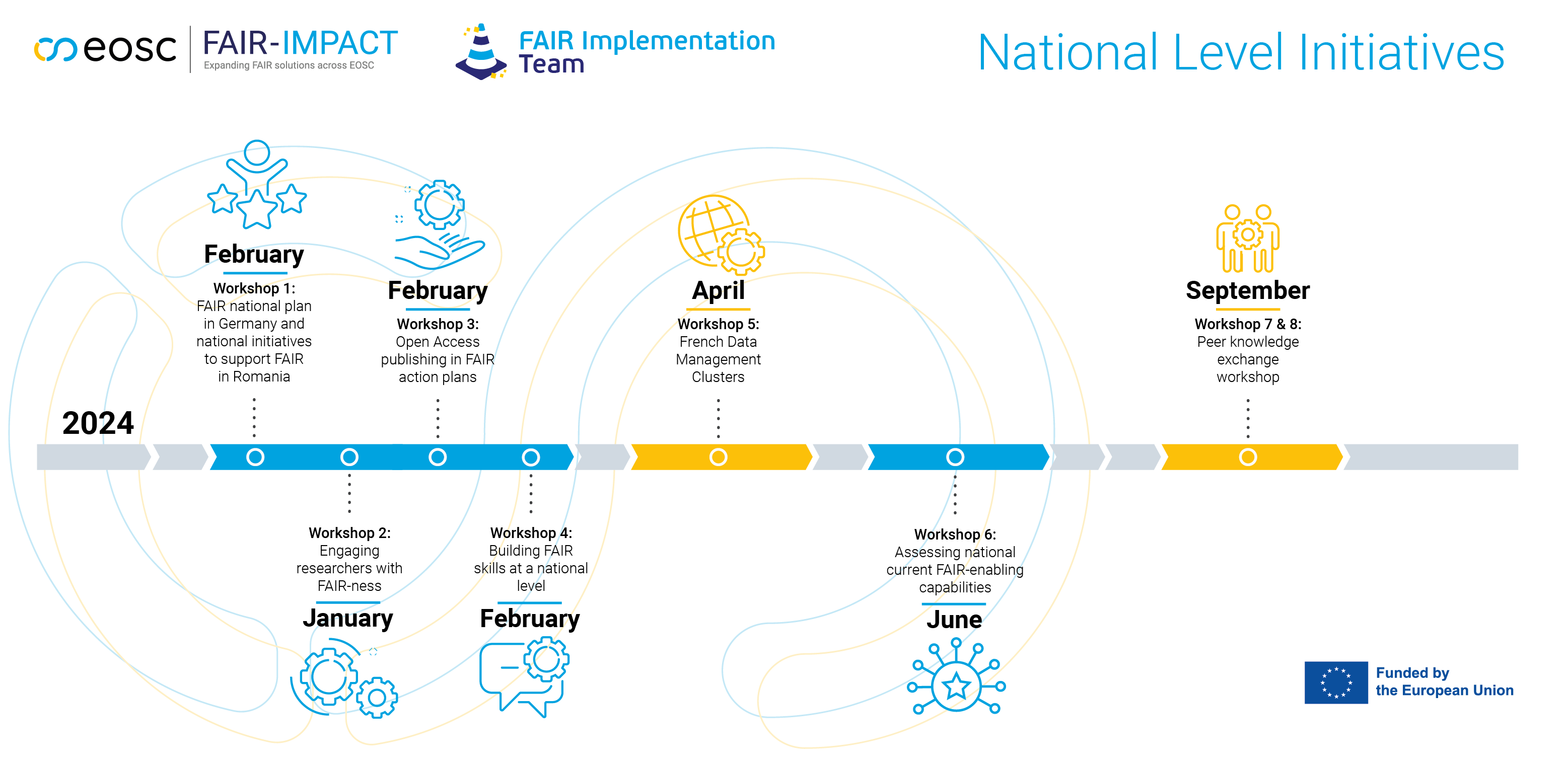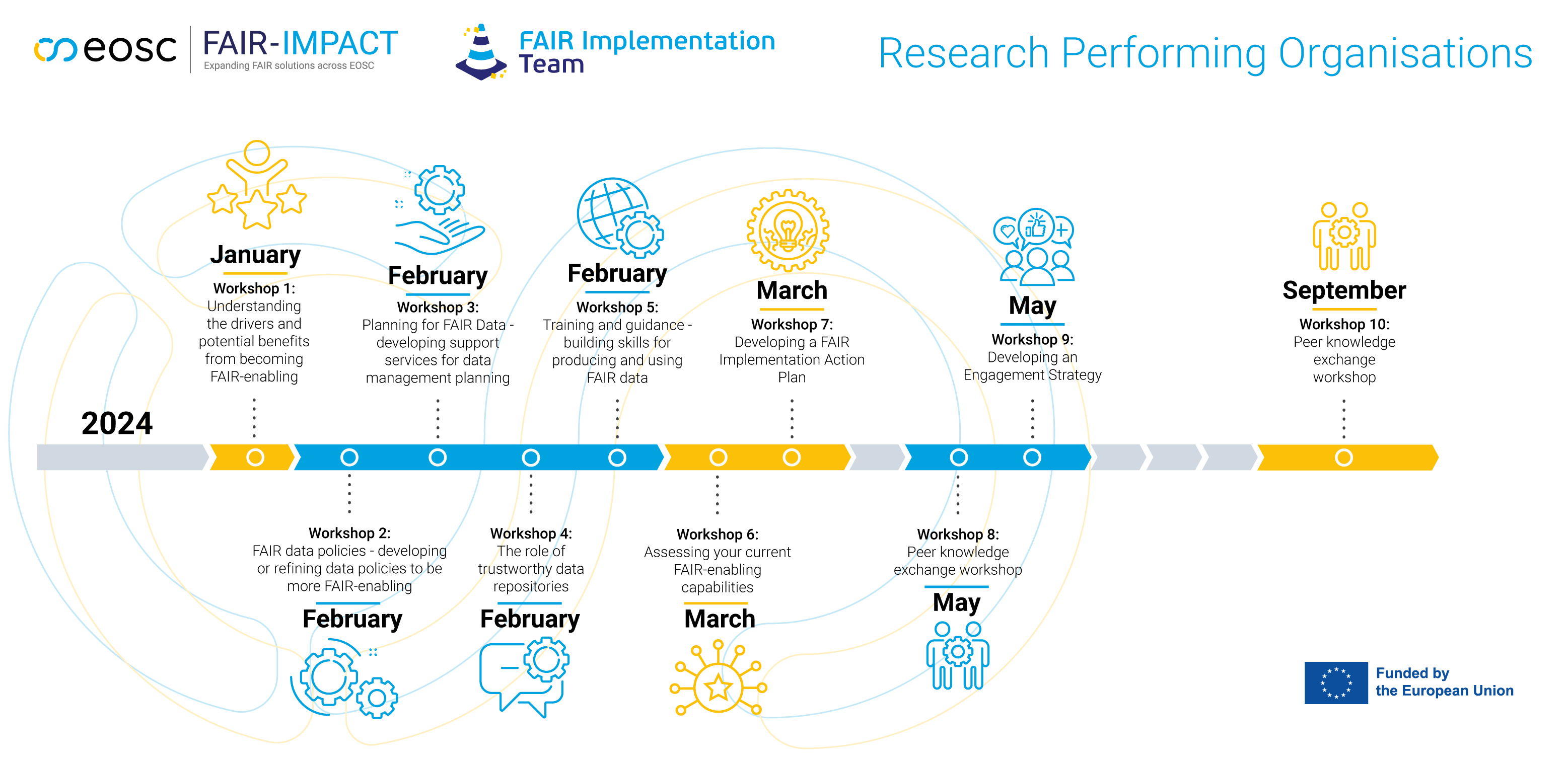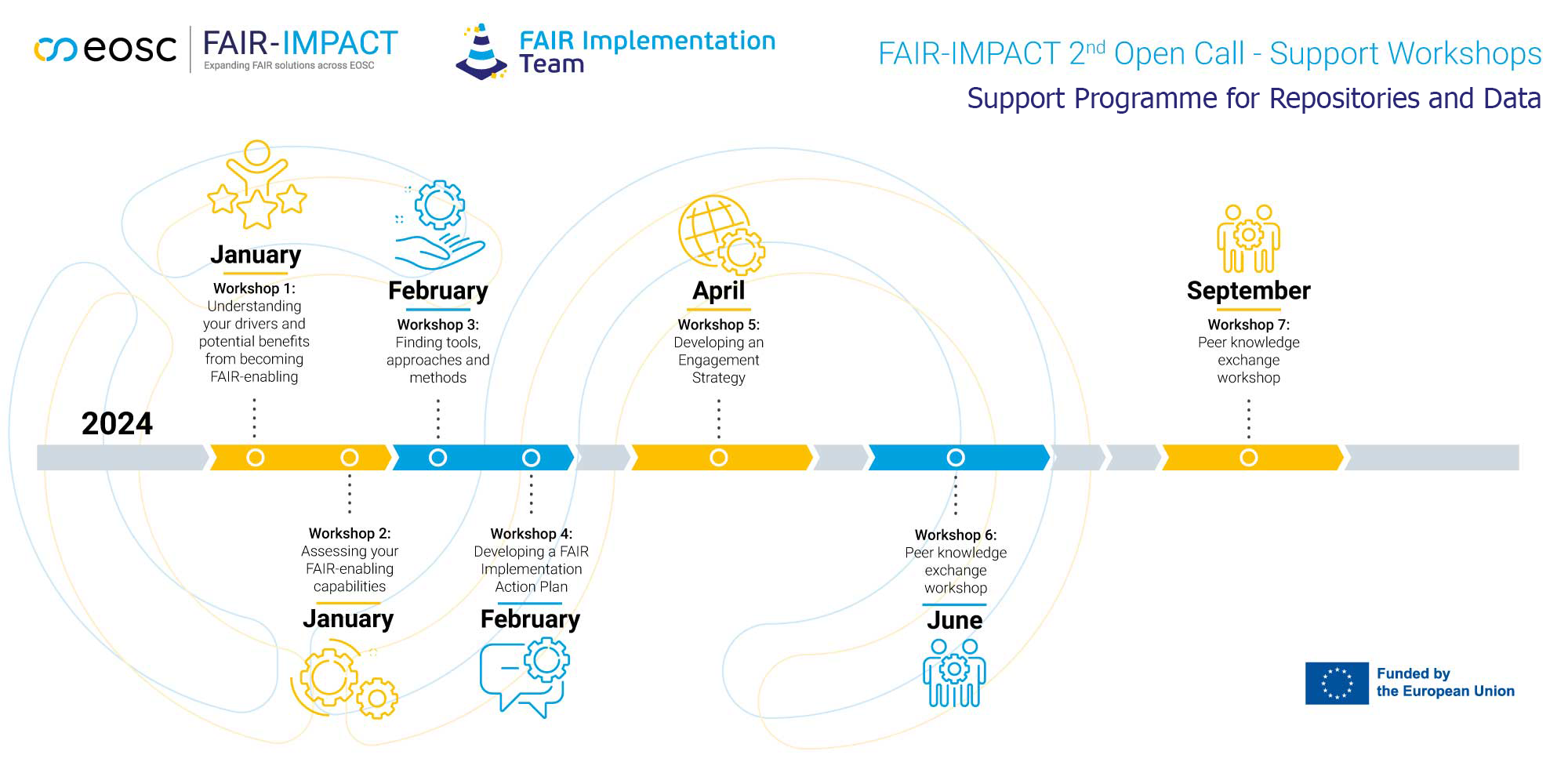For those just getting started on their FAIR-enabling journeys, FAIR-IMPACT provided dedicated guidance and one-to-one support to successful applicants from our three key stakeholder groups to self-assess their current capabilities and to develop FAIR implementation action plans: National Levels Initiatives, Research Performing Organisations, Repositories and Data Service Providers.
Successful applicants from each of the three stakeholder groups worked over a period of nine months with FAIR-IMPACT mentors and external experts to learn how to support the uptake of FAIR-enabling practices. This included participation in a series of virtual workshops based on the FAIR Implementation Framework, assessed homework and one-to-one support. This call was suitable for those who are just getting started with supporting the FAIR Principles or are less advances on their FAIR-enabling journey.
Successful applicants received one-to-one support with dedicated mentors (financial support was not provided for this specific programme). This first open call for Route 1 support was open for applications between 30th August and 1st November 2023.
Details of the support programmes:
- 1. Support Programme for National Level Initiatives
-
Participation in this support programme helped national organisations and researchers to better understand the drivers for becoming more FAIR-enabling, to assess their current FAIR-enabling capabilities and develop plans for improvement, and to ensure that they have an effective engagement strategy in place to facilitate uptake at the national level.
This support program was open to all but especially dedicated to organisations working at a national level and researchers to build adoption of FAIR practices. National initiatives and mandated organisations were both targets and providers of the webinars.
The support programme began in January 2024 as a series of virtual workshops where participants were introduced to key concepts that can support their journey toward becoming FAIR-enabling. As part of the programme, participants carried out a supported self-assessment of their current capabilities and developed action plans to improve one or more areas. Participants received one-to-one support from FAIR-IMPACT over a period of nine months as they implemented their action plans. A series of curated webinars showcased specific tools and approaches that may help to implement FAIR in a practical sense.
Enabling knowledge exchange was a key objective of the support programme and there were two workshops held in month six and month nine where participants shared their experiences with peers in the support programme. An exit interview resulted in a co-produced FAIR Implementation Story that was published in our Zenodo community and made available to help to share the experiences with the wider community.
This call was open for applications between 30th August and 1st November 2023.
A summary of the support programme and a collection of resources are available here.
Successful applicants to the National Level Support Programme:
- Nene Barry, Luxembourg National Data Service
- Chokri Ben Romdhane, CNUDST
- Oscar Sanchez, Dialnet Foundation
- Joanne Yeomans, TDCC Natural & Engineering Sciences
Support programme for National Level Initiatives
Virtual workshops
Time
Date of Workshop Workshop 1: FAIR national plan in Germany and national initiatives to support FAIR in Romania
14-16 CET 1st February 2024 10-12 CET 2nd February 2024 10-12 CET 6th February 2024 Workshop 4: Building FAIR skills at a national level 11-13 CET 27th February 2024 During March, participants worked independently to carry out self-assessments and to develop draft action and engagement plans. One-to-one periodic support from FAIR-IMPACT was provided via email or zoom. Workshop 5: French Data Management Clusters 10-12 CET 4th April 2024 During May, participants worked independently to develop their draft action and engagement plans. One-to-one periodic support from FAIR-IMPACT was provided via email or zoom. Workshop 6: Assessing national current FAIR-enabling capabilities
TBC 14 May 2024 During June/July/August, participants worked independently to implement action and engagement plans. One-to-one periodic support from FAIR-IMPACT was provided via email or zoom.
Workshop 7 and 8: Peer knowledge exchange workshop
Exit interviews were carried out in October and were the basis of a co-produced FAIR Implementation Story summarising the key actions and lessons learned. Follow-up questionnaire and/or interview with participants 6 months after the support programme wrapped up to see what progress has been made. (March/April 2025) 
- 2. Support Programme for Research Performing Organisations
-
Participation in this support programme aimed to help research performing organisations to better understand the drivers for becoming more FAIR-enabling, to assess their current FAIR-enabling capacity and develop plans for improvement, and to ensure that they have an effective engagement strategy in place to facilitate uptake across the organisation. The structure of the programme was based around the FAIR Implementation Framework (FIF) stages.
The support programme ran from January to October 2024 an included a series of ten virtual workshops where the 20 participating RPOS were introduced to key concepts that can support their journey toward becoming more FAIR-enabling. As part of the programme, participants carried out a supported self-assessment of their current capabilities and develop action plans to improve one or more areas.
The participants were provided with a FAIR-enabling self assessment and planning workbook to enable them to work collaboratively with their peers from across the organistion as they progressed throuh the steps of the FAIR Implementation Framework, carried out their self-assessment, and developed an action plan for advancement.
Successful applicants received:
- a review of their research data policy and recommendations from their FAIR-IMPACT mentors on how to make it more FAIR-enabling. If they do not yet have a research data policy, support will be provided from FAIR-IMPACT mentors to start developing one.
- support form their mentors to plan and deliver one local workshop bringing together different stakeholders across their organisation to self-assess current FAIR-enabling capabilities.
- one-to-one support from FAIR-IMPACT mentors to develop their actions plans and define their engagement strategies.
Enabling knowledge exchange was a key objective of the support programme and there were two dedicated workshops where participants shared their experiences with peers during the support programme.
Upon completion of the support programme, participants were invited to prepare a FAIR Implementation Story to be published in our Zenodo community to help to share the experiences with the wider community.
This call was open for applications between 30th August and 1st November 2023
Successful applicants to the Research Performing Organistions Support Programe:
- Dario Basset, UNIMI
- Brandusa Bitel, Carol Davila, University of Medicine and Pharmacy
- Ieva Cesevičiūtė, Kaunas University of Technology
- Natalie Dallat, Ulster University
- Petra Dedicova, Brno University of Technology
- Patricia Martínez Galisteo, Foundation for the Promotion of Health and Biomedical Research of Valencia Region, FISABIO
- Bianca Gualandi, University of Bologna
- John Hyland, Teagasc
- Emilia Jarochowska, Utrecht University
- Liise Lehtsalu, Eurac Research
- Tanja Lindholm, University of Helsinki
- Bora Lushaj, Erasmus University Rotterdam
- Sophie Meeus, Meise Botanic Garden
- Laura Niemi, University of Turku
- Irena Njezic, Torlak Institute of virology vaccines and sera
- Michael O'Connor, Queen's University Belfast
- Linda Ohrtmann, Paris-Lodron University of Salzburg
- Lohitzune Solabarrieta Odriozola, AZTI
- Sheila Izquieta-Rojano, University of Navarra. BIOMA Institute
- Inge Slouwerhof, Radboud University
Read the FAIR Implementation stories produced by this support programme
Support programme for Research Performing Organisations
Virtual workshops
Time
Date of Workshop Workshop 1: Kick-off session and understanding the drivers and potential benefits from becoming FAIR-enabling
15-17 CET 14th February 2024 Workshop 2: FAIR data policies - developing or refining data policies to be more FAIR-enabling
15-17 CET 28th February 2024 Workshop 3: Planning for FAIR Data - developing support services for data management planning
15-17 CET 6th March 2024 Workshop 4: The role of trustworthy data repositories 15-17 CET 13th March 2024 Workshop 5: Training and guidance - building skills for producing and using FAIR data 15-17 CET 20th March 2024 Workshop 6: Developing a FAIR Implementation Action Plan 15-17 CET 27th March 2024 During April, participants began to work independently - but with periodic support from their mentors - to develop draft action plans based on the incremental self-assessments that were carried out during and between the thematic workshops. Workshop 7: Peer knowledge exchange workshop
15-17 CET 24th April 2024 Workshop 8: Developing an Engagement Strategy
15-17 CEST 8th May 2024 During May, June, July and August the participants continued to flesh out their action plan and meet with their mentors. Participants will be supported to organise one virtual workshop bringing together key stakeholders from across their organisation to share and validate the results of their self-assessment and to introduce the draft action plan.
Workshop 9: Peer knowledge exchange workshop 15-17 CEST 19th June 2024 Workshop 10: Peer knowledge exchange workshop
15-17 CEST 2nd October 2024 Exit interviews were carried out in late September and were the basis of a co-produced FAIR Implementation Story summarising the key actions and lessons learned. Follow-up questionnaire and/or interview with participants 3-6 months after the support programme wrapped up to see what progress has been made. We will also seek to learn about challenges and difficulties that have been encountered. (March/April 2025)

- 3. Support Programme for Repositories and Data Service Providers
-
The FAIR Principles focus on characteristics of digital objects that make them Findable, Accessible, Interoperable and Reusable. Achieving and maintaining those characteristics depends on the individuals and organisations that create, store, curate, and preserve the objects. These activities are 'FAIR-enabling’, and repositories and data service providers play an important role in facilitating them.
FAIR-IMPACT aimed to help you assess your current FAIR-enabling capabilities and develop action plans to improve them. The structure of our support programme was based on components of the ‘FAIR-IMPACT FAIR Implementation Framework’ (FIF), a curated collection of services and tools that can be used to become more FAIR-enabling. The services and tools address a wide range of topics, such as:
Repository policy, e.g. ACME-FAIR, Data support policy for photon and neutron science; Making objects in the repository more FAIR, e.g. CESSDA Data Archiving Guide, FAIR Cookbook; Automated FAIR assessment, e.g. F-UJI, Framework for assessing FAIR services; Repository certification, e.g. CoreTrustSeal+FAIRenabling Capability Maturity Model, FAIRsFAIR repository support; EOSC readiness, e.g. EOSC Service compliance, DataCite Repository Finder.Enabling knowledge exchange is one of the key objectives of the support programme. To this end, in two workshops in June and September participants shared their experiences with peers in the support programme. The programme wrapped-up with a personal exit interview that resulted in a co-produced FAIR Implementation Story which were published in our Zenodo community to share the unique experience of each participant and enable networking with the wider community.
The minimum effort expected from participants was around fifty hours for the whole programme. The actual effort depended on the specific FIF resources participants implemented and on input needed from colleagues in participants' organisations. To benefit most from the programme, representatives from the participating repositories were expected to bring expertise in policy, engagement, and repository technology, split across a maximum of three people.
This support programme continues the successful repository support programme from the earlier FAIRsFAIR project, but with a broader focus on topics and wider range of resources that repositories can implement to increase their FAIR impact.
The suppot programme aimed to go beyond the formal FAIR principles and included guidance for effective strategies to engage with user communities and to position the repository in the research landscape. In other words, we aimed to help make participating organisations more successful.
The support programme began in January 2024 as a series of virtual workshops where we introduced key concepts around FAIR and explored how they may apply to your organisation. Participants carried out a supported self-assessment of their current FAIR-enabling capabilities and developed action plans tailored to their needs and ambition. Participants received one-to-one support from the FAIR-IMPACT support team over a period of nine months as they developed and implemented their action plans. A series of curated webinars showcased specific tools and approaches that may help repositories to implement the FAIR principles in a practical sense and participants also had the opportunity for virtual ‘sight-seeing’ at some of our partners to see how they implement certain FAIR-enabling practices.
This call was open for applications between 30th August and 1st November 2023.
The support programme for Repositories and Data Service Providers made use of several instruments covering the steps outlined in the FAIR Implementation Framework. Please make use of these to self-assess your own repository or data service.
- Consider Your Drivers instrument
- Assessing Your Capabilities instrument
- Developing a Stakeholder Engagement Strategy instrument
- FAIR Implementation Action Plan instrument
Successful applicants to the Repositories and Data service Providers Support Programme:
- Chokri Ben Romdhane, CNUDST
- Julian Lopez Gordillo, Naturalis Biodiversity Centre
- Florian Hutzler, Paris-Lodron, University of Salzburg
- Catherine Jones, UKRI/STFC
- Elena Poenaru, Carol Davila, University of Medicine and Pharmacy
- Tatjana Zubic, University of Novi Sad

First open call for Route 1 support timeline |
|
|
Promotional online workshops to showcase the support actions on offer |
|
|
Call launched and platform opened for applications |
30 August 2023 |
|
Virtual clinic for potential applicants to the open call |
18 October 2023 - WATCH THE RECORDING |
|
Deadline for applications |
1 November 2023 |
|
Evaluation and selection of applicants |
End of November 2023 |
|
Applicants informed of decision |
December 2023 |
|
Expected start date for support actions |
Late January 2024 |